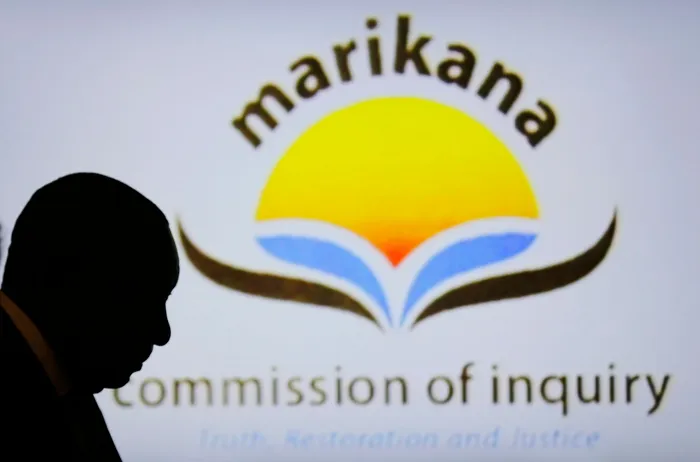Marikana 11 years on: Survivors vow to continue pressing President Cyril Ramaphosa for an apology and compensation

A silhouette of a man near a banner written Marikana Commission of Inquiry A file photo of President Cyril Ramaphosa silhouetted in the Farlam Commission of Inquiry, at the public hearings held in Centurion, Tshwane in August 2014. File Picture: Siphiwe Sibeko/ Reuters
An attorney representing Marikana mineworkers who were part of the wage protest action in the months leading to August 2012, on Wednesday said the victims of the tragedy might not get the apology they were hoping for.
On August 16, 2012, 34 people, mostly striking miners, were shot dead and 78 people were wounded when police fired on a group gathered at a hill near the mine while attempting to disperse and disarm them.
In the preceding week, 10 people, including two policemen and two security guards, were killed.
Attorney Andries Nkome, speaking to broadcaster Newzroom Afrika on the 11th anniversary of the tragedy, insisted that his clients regard President Cyril Ramaphosa as one of the architects behind the massacre.

Nkome said so far, the miners argue that Ramaphosa’s apologies have been veiled and half-hearted.
At the time of the tragedy, Ramaphosa was serving as a member of the African National Congress’ national executive committee, a Lonmin shareholder and a non-executive board member.
“I think as time goes by, our clients start to lose hope in the fact that those that they believe caused the massacre will apologise, and it is for that reason that they become steadfast in their belief that the courts are the only forum for hope, out of which they will be able to get apologies given.
“They (miners who survived the tragedy) say that the massacre took place as a result of the characterisation of their labour dispute with Lonmin by President Cyril Ramaphosa when he said their acts were dastardly criminal and the police must act with concomitant action.
“He went on and gave an apology, though it was veiled. It was not unconditional, and so it is for that reason that they (miners) are pressing forward hoping to get justice someday in the future,” said Nkome.
He said the surviving miners want an apology, compensation and criminal liability for the people who authored the tragic events, including politicians, Lonmin mine officials and the police officers.
Ramaphosa’s controversial email which became part of the commission of inquiry which followed the tragedy, was sent on August 15, just 24 hours before the protesting miners were shot in a televised event that shocked South Africans and people across the world.
In October 2012, at the second day of the public hearings of the commission of inquiry into the tragedy, the name of the then ANC heavyweight and businessman – Ramaphosa – featured prominently at the inquiry chaired by retired judge Ian Farlam at the Rustenburg Civic Centre.

Advocate Dali Mpofu, representing the miners injured and arrested after the shooting on August 16, said there was an e-mail in which Ramaphosa strongly condemned the protests, described them as criminal acts and suggested "concomitant action".
"This (e-mail) was on August 15, at 2.58pm, exactly 24 hours before the people were mowed down on that mountain," said Mpofu.
"We have e-mails that were being exchanged between Lonmin management, government ministers (of mineral resources and the police), and at the centre is a gentleman called Cyril Ramaphosa.
"He advanced that what was taking place were criminal acts and must be characterised as such. In line with this characterisation (Ramaphosa said) there needs to be concomitant action to address the situation," Mpofu argued.
IOL
Related Topics: